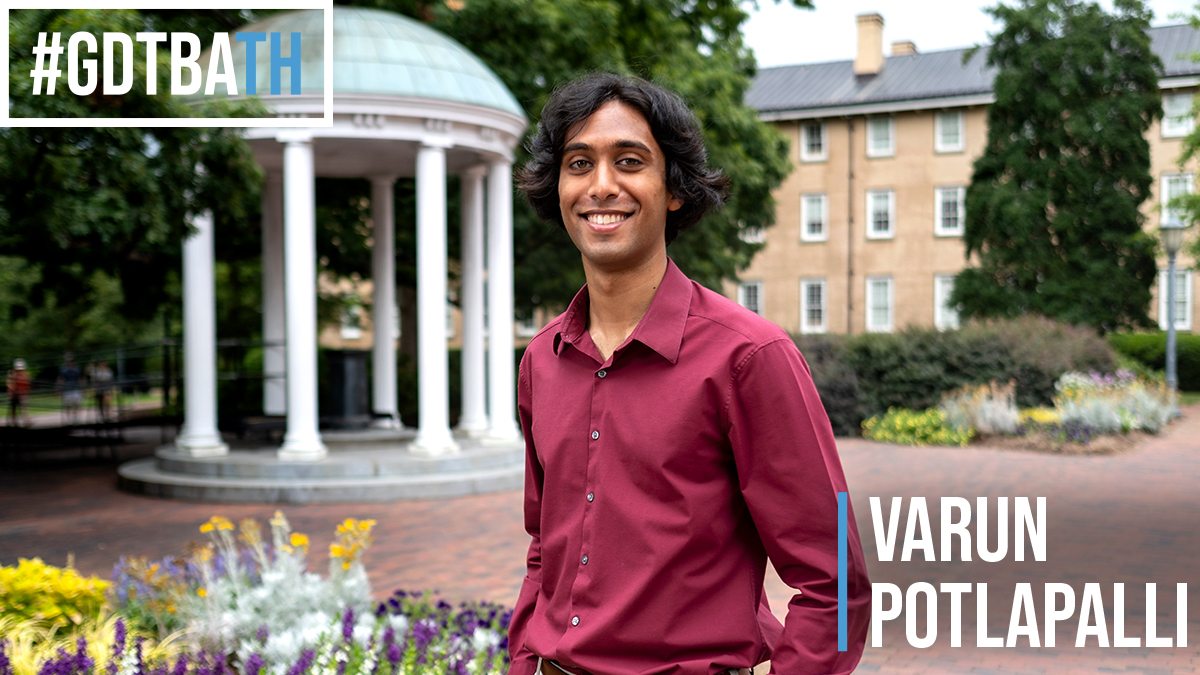#GDTBATH: Varun Potlapalli
Varun Potlapalli has always seen himself becoming a medical doctor and wants to keep research a large part of that future. To get a glimpse into his future in an MD-Ph.D. program, the Carolina senior is spending his summer shadowing doctors and conducting research.

Varun Potlapalli’s plan to pursue an MD and a Ph.D. after graduating from UNC-Chapel Hill emerged naturally. The Carolina senior has always known he wanted to be a physician, and he’s come to view research as a crucial aspect of that venture.
Like any good doctor, Potlapalli has never been one to make a decision without collecting the right information — particularly when it comes to a career that he’ll spend several more years training for.
“I always want to know, as in-depth as possible, what I’m getting myself into,” he said. “I see the summer as the time to be able to really focus on learning more about what I see myself doing in the future.”
So the Tar Heel has spent this summer getting his feet wet in MD-Ph.D. studies as part of a collaboration between the UNC School of Medicine’s MD-Ph.D. program and the Chancellor’s Science Scholars. For the past several weeks, Potlapalli has been shadowing doctors, attending grand rounds at UNC Hospitals, meeting with current MD-Ph.D. students and preparing a presentation on his own research.
“The opportunities that they’re providing are really crucial because it allows us to see what we would actually be doing as physicians and how they deal with cases and interact with patients,” said Potlapalli, who is majoring in biochemistry in the College of Arts and Sciences. “Those types of experiences are really important because they help you think about whether this is something you actually want to do.”
Potlapalli has always had a career in medicine in the back of his mind, but it was his biochemistry courses in high school and then the Chancellor’s Science Scholar’s Summer EXCELerator his first year at Carolina that piqued his interest in pursuing both an MD and Ph.D., which emphasizes both patient care and research.
The Chancellor’s Science Scholars program, Potlapalli said, “drove home the importance of research,” and within a few months at Carolina, he was looking for a lab to join. He landed a spot in the School of Medicine’s Infectious Disease Epidemiology and Ecology Lab, studying malaria alongside Assistant Professor Dr. Jessica Lin.
While he researched understudied species of malaria throughout sub-Saharan Africa, he developed an even stronger passion for research.
“After experiencing how labs are run, after experiencing countless times of my assays not working the way they’re supposed to and troubleshooting them, I would say I fell in love with it,” Potlapalli said. “While it’s challenging, it’s also something I’m finding that I enjoy doing.”
The work in the lab made it clear to the Tar Heel that he couldn’t just be a physician working with patients. He also wanted to be in the lab making discoveries that could help more people.
“I can’t see myself just practicing medicine or just doing research because I want the research that I do to be translational,” Potlapalli said.
The pairing sounded great in concept, and as part of the MD-Ph.D. program’s summer experience through the UNC School of Medicine and Chancellor’s Science Scholars, Potlapalli is testing out the career to see if it is the right fit for him.
Potlapalli first participated in the experiential learning program virtually last summer because of the pandemic. He returned this year to get hands-on experience at the hospital.
Not only does the program allow him to shadow practicing doctors throughout the summer, but he also has the chance to meet with current MD-Ph.D. students. The student mentors help the undergraduates prepare presentations on their research.
Potlapalli has spent the summer researching a species of malaria that causes relapsing infections and is also difficult to detect in bloodwork. The Tar Heel is refining and comparing existing techniques to identify it in clinical blood samples. At the end of the summer, he will present that research to the MD-Ph.D. program alongside presentations from incoming medical students.
Potlapalli is currently working on his medical school applications, and the mentorship from current students has been particularly helpful as he works through that process.
The experience as a whole, he said, has confirmed he’s on the right path.
“This summer program has really opened me up to all the different angles possible when it comes to investigating whether MD-Ph.D. is the right dual-degree program for me,” Potlapalli said. “It’s only strengthened my passion for it. It’s a lot more intense than I previously thought it was, but to me, that’s a good thing. I want it to be intense. I want it to be rigorous because I know this is something I want to do moving forward.”




